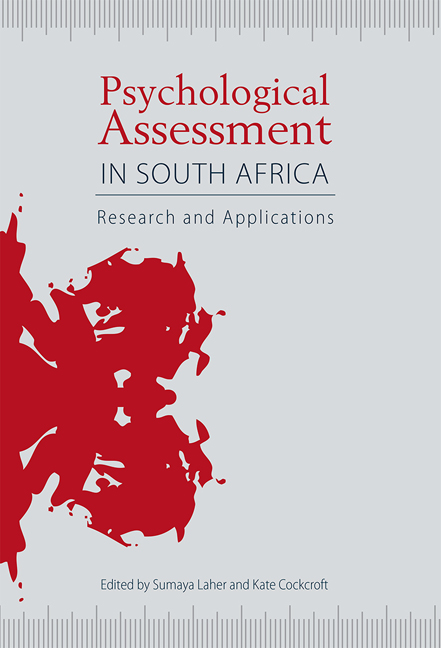Book contents
- Frontmatter
- Contents
- Tables and figures
- Acknowledgements
- Acronyms and abbreviations
- 1 Contextualising psychological assessment in South Africa
- Section One Cognitive tests: conceptual and practical applications
- 2 WAIS-III test performance in the South African context: extension of a prior cross-cultural normative database
- 3 WISC-IV test performance in the South African context: a collation of cross-cultural norms
- 4 The Senior South African Individual Scales – Revised: a review
- 5 Assessing school readiness using the Junior South African Individual Scales: a pathway to resilience
- 6 School readiness assessment in South Africa
- 7 The Kaufman Assessment Battery in South Africa
- 8 The Das-Naglieri Cognitive Assessment System
- 9 Dynamic assessment in South Africa
- 10 The Learning Potential Computerised Adaptive Test in South Africa
- 11 APIL and TRAM learning potential assessment instruments
- 12 The Griffiths Mental Development Scales: an overview and a consideration of their relevance for South Africa
- 13 Neuropsychological assessment in South Africa
- Section Two Personality and projective tests: conceptual and practical applications
- Section Three Assessment approaches and methodologies
- Contributors
- Index
13 - Neuropsychological assessment in South Africa
from Section One - Cognitive tests: conceptual and practical applications
Published online by Cambridge University Press: 21 April 2018
- Frontmatter
- Contents
- Tables and figures
- Acknowledgements
- Acronyms and abbreviations
- 1 Contextualising psychological assessment in South Africa
- Section One Cognitive tests: conceptual and practical applications
- 2 WAIS-III test performance in the South African context: extension of a prior cross-cultural normative database
- 3 WISC-IV test performance in the South African context: a collation of cross-cultural norms
- 4 The Senior South African Individual Scales – Revised: a review
- 5 Assessing school readiness using the Junior South African Individual Scales: a pathway to resilience
- 6 School readiness assessment in South Africa
- 7 The Kaufman Assessment Battery in South Africa
- 8 The Das-Naglieri Cognitive Assessment System
- 9 Dynamic assessment in South Africa
- 10 The Learning Potential Computerised Adaptive Test in South Africa
- 11 APIL and TRAM learning potential assessment instruments
- 12 The Griffiths Mental Development Scales: an overview and a consideration of their relevance for South Africa
- 13 Neuropsychological assessment in South Africa
- Section Two Personality and projective tests: conceptual and practical applications
- Section Three Assessment approaches and methodologies
- Contributors
- Index
Summary
What neuropsychologists do best is describe behaviour – as it was in the past, as it is now, and as the individual is likely to behave in the future.
(Nell, 2000, p.104)This chapter is devoted to the current position of neuropsychological assessment in the South African context. With this in mind, a short overview defining the field and the profession is presented, followed by a review of neuropsychological assessment. A discussion follows of the major issues facing neuropsychological assessment in the South African context, including test adaptation. A brief discussion of the way forward concludes the chapter.
Defining neuropsychology
The term ‘neuropsychology’ may have its origins in the 16th century (Boeglin & Thomas, 1996), but general consensus is that the first modern use of the term can be attributed to William Osler in 1931 and later Donald Hebb in 1949 (Kolb & Whishaw, 1996). Neuropsychology is frequently defined as the relationship between brain functioning and behaviour, but with the collapse of Cartesian dualism, this focus has been expanded to include the study of the mind (Wilkinson, 2004). With the mind today seen as the output of the brain's neuronal connectivity (Le Doux, 2002), it is therefore available for objective consideration as well. Although open to debate, modern neuropsychology thus encompasses not only the understanding and interpretation of structural/functional brain systems, particularly in neuropathology, but includes broader understandings such as the effect of psychotherapy on brain functioning (Gabbard, 2000; 2006), the neurobiology of personality (Bergvall, Nilsson & Hansen, 2003; Blair, 2003), and the neurobiology of sense of self (Solms, 2006).
There have been two dominant traditions in neuropsychology: a syndromebased clinical approach and a cognitive neuroscientific approach. Clinical neuropsychology as understood today was first practised in the late 19th century with the cortical localisation of function by Dax, Broca, Wernicke and Charcot (Solms, 2008; Zillmer, Spiers & Culbertson, 2008). It is dependent upon a clinico anatomical analysis, using the medical model as its theoretical basis. Cognitive neuropsychology, first named in the late 1970s (Gazzaniga, Ivry & Mangun, 2009), grew out of cognitive psychology and neuroscience and assumes that mental activities operate in terms of specialised subsystems or modules that can be separated out (dissociated) from each other (Gazzaniga et al., 2009; Sternberg, 2009). It maintains close links to information processing and artificial intelligence (Reed, 2010).
- Type
- Chapter
- Information
- Psychological Assessment in South AfricaResearch and Applications, pp. 186 - 200Publisher: Wits University PressPrint publication year: 2013



